
Yearbook of Phraseology
Scope & Guideline
Charting New Territories in Phraseological Studies
Introduction
Aims and Scopes
- Phraseological and Paroemiological Studies:
The journal emphasizes research in phraseology and paremiology, investigating the structure, meaning, and usage of idioms and proverbs in various languages. - Cross-Linguistic and Comparative Analysis:
A core area of focus is the comparative study of phraseological units across languages, highlighting similarities and differences in expression and meaning. - Cognitive and Semantic Approaches:
The journal explores cognitive perspectives on phraseology, examining how idiomatic expressions reflect cognitive processes and semantic structures. - Digital and Computational Methods:
There is a growing emphasis on the use of digital tools and computational methods in phraseological research, including corpus linguistics and data analysis. - Educational Applications of Phraseology:
The journal also addresses the pedagogical implications of phraseology, considering how knowledge of idioms and collocations can enhance language teaching and learning.
Trending and Emerging
- Integration of Phraseology with Digital Humanities:
Recent issues highlight the intersection of phraseology with digital humanities, showcasing how technology can facilitate new methodologies in phraseological research. - Idioms in Specific Contexts:
There is an increasing focus on idioms within specific discourses, such as medical or digital communication, illustrating the relevance of context in understanding phraseological usage. - Cognitive Linguistics and Phraseology:
The application of cognitive linguistics to phraseology is on the rise, as researchers investigate how idiomatic expressions are processed cognitively and their implications for language comprehension. - Interdisciplinary Approaches:
Emerging themes indicate a trend towards interdisciplinary research, where phraseology is studied in conjunction with fields such as sociology, psychology, and cultural studies.
Declining or Waning
- Historical and Etymological Studies:
Research focusing on the historical and etymological aspects of phraseology, while still relevant, has seen less emphasis in recent publications compared to contemporary and applied studies. - Narrowly Defined Dialectal Studies:
Specific studies on dialectal variations of phraseological units have become less common, with a shift towards broader, more comparative analyses. - Traditional Phraseological Definitions:
The exploration of traditional definitions and classifications of phraseological units appears to be waning, as researchers increasingly adopt innovative and interdisciplinary approaches.
Similar Journals

RUSSIAN LINGUISTICS
Advancing the frontiers of Russian language studies.RUSSIAN LINGUISTICS is a peer-reviewed academic journal published by Springer, dedicated to advancing the understanding of the Russian language and its interplay with various linguistic frameworks. With a longstanding history that spans from its inception in 1974, the journal encompasses a broad range of topics within the fields of linguistics and language studies, offering valuable insights especially in *Developmental and Educational Psychology* and the intricacies of linguistics at large. Currently ranked in the Q2 quartile for Linguistics and Language, and holding substantial positions within Scopus rankings, RUSSIAN LINGUISTICS serves as an essential resource for researchers, educators, and students alike, fostering dialogue and collaboration within the international linguistic community. The journal notably provides critical access to research findings that enhance the comprehension of Russian linguistics' role in a global context, despite operating under a traditional access model. For those pursuing scholarly excellence, RUSSIAN LINGUISTICS remains a pivotal platform for disseminating innovative research and promoting the study of language.
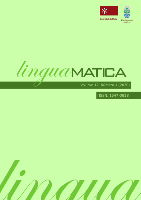
Linguamatica
Exploring Linguistic Frontiers Through Rigorous Research.Linguamatica is a prominent open-access journal published by UNIV MINHO, INST EDUCACAO, CENTRO INVESTIGACAO EDUCACAO in Portugal, with the objective of advancing the field of linguistics and language studies. Since its establishment in 2009, the journal has served as a vital platform for disseminating high-quality research and innovative studies in linguistics, emphasizing both theoretical and applied perspectives. With an impressive Scopus ranking placing it in the 76th percentile in Arts and Humanities and the 73rd percentile in Social Sciences, Linguamatica is recognized for its significant contributions and rigorous peer-review process. The journal's commitment to open-access publishing ensures that research findings are accessible to a wider audience, fostering collaboration and knowledge sharing among researchers, professionals, and students. Located at CAMPUS GUALTAR, BRAGA 4710, PORTUGAL, Linguamatica aims to be a leading source of valuable insights in linguistics, covering a diverse array of topics from language acquisition to sociolinguistics, thereby playing a crucial role in shaping contemporary language research.

Language and Linguistics
Fostering Interdisciplinary Approaches to LinguisticsLanguage and Linguistics is a leading academic journal published by ACAD SINICA, INST LINGUISTICS, based in Taiwan. Established in 2008, this journal has rapidly gained recognition within the field of linguistics, achieving a commendable ranking of Q2 in the 2023 category quartiles and holding positions in the top percentiles of Scopus rankings for both Arts and Humanities and Social Sciences. With an ISSN of 1606-822X and an E-ISSN of 2309-5067, the journal aims to foster the development of linguistics research by providing a platform for the dissemination of innovative and interdisciplinary studies. While it currently operates on a traditional subscription model, its significant contribution to the advancement of linguistic theory and its applications makes it an invaluable resource for researchers, professionals, and students alike. Spanning converged years from 2008 to 2024, Language and Linguistics continues to shape the dialogue in understanding language phenomena and encourages submissions that push the boundaries of current linguistic knowledge.
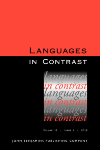
Languages in Contrast
Exploring the Rich Tapestry of Linguistic DiversityLanguages in Contrast, a distinguished journal published by John Benjamins Publishing Co, serves as a vital platform in the field of linguistics, particularly focusing on the comparative study of languages. Operating under the ISSN 1387-6759 and E-ISSN 1569-9897, this journal has established its significance, achieving a commendable Q2 ranking in the 2023 Linguistics and Language category, indicative of its strong impact and reputation within the scientific community. With a Scopus ranking of #294 out of 1167, positioning it in the 74th percentile of its field, it consistently publishes high-quality research that explores the nuances and contrasting features of various languages, fostering deeper understanding and knowledge sharing among researchers, professionals, and students alike. While the journal is not open access, its rigorous peer-review process ensures that the contributions it includes are both insightful and groundbreaking, making it an invaluable resource for anyone invested in the study of languages. With coverage extending from 2008 to 2024, Languages in Contrast is poised to continue its pivotal role in advancing linguistic research and scholarship.

REVISTA DE FILOLOGIA DE LA UNIVERSIDAD DE LA LAGUNA
Advancing linguistic insights from the heart of the Canary Islands.REVISTA DE FILOLOGIA DE LA UNIVERSIDAD DE LA LAGUNA is a prestigious academic journal dedicated to advancing the fields of linguistics and language studies. Published by the Universidad de la Laguna in Spain, this journal serves as an essential resource for researchers, professionals, and students alike, offering critical insights and scholarly articles that contribute to the understanding of language and its intricacies. With its inclusion in the Q3 category of the 2023 Linguistics and Language rankings and Scopus rankings, it demonstrates a growing impact within the academic community, while maintaining a commitment to fostering dialogue and disseminating valuable research. As a platform for innovative ideas and diverse perspectives, the journal aims to bridge theoretical approaches and practical applications, ensuring that readers are well-equipped to engage with contemporary issues in linguistics. Although it is currently not open access, the journal remains an influential contributor to the language and linguistics sectors, operating from the picturesque Canary Islands, enhancing its appeal not only as a scholarly resource but also as a culturally rich platform for academic expression.
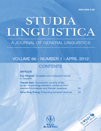
STUDIA LINGUISTICA
Unveiling the Rich Tapestry of Language StudiesSTUDIA LINGUISTICA is a prestigious journal published by Wiley, focusing on the dynamic and multifaceted fields of Linguistics and Language. With an ISSN of 0039-3193 and an E-ISSN of 1467-9582, the journal has been a vital resource for academics since its inception in 1947, diligently converging insights from history and philosophy of science alongside contemporary linguistic research. Demonstrating excellent scholarly impact, STUDIA LINGUISTICA proudly holds a Q1 ranking in Linguistics and Language as well as a Q2 in History and Philosophy of Science as of 2023, indicating its significance within these academic domains. Furthermore, it ranks in the top percentiles among similar journals, with a commendable 73rd percentile in Language and Linguistics and 70th in related social sciences. Although it does not offer Open Access, its contribution to the discourse of language studies is underpinned by rigorous peer-review processes and commitment to advancing theoretical and empirical research. For researchers, professionals, and students alike, STUDIA LINGUISTICA remains an essential platform for disseminating impactful linguistic scholarship worldwide.

Lege Artis-Language Yesterday Today Tomorrow
Fostering Interdisciplinary Insights into LanguageLege Artis: Language Yesterday Today Tomorrow is a pivotal open access journal dedicated to the dynamic and multifaceted study of language, linguistics, and communication in contemporary society. Published by the esteemed University of SS Cyril & Methodius in Trnava, Slovakia, this journal serves as a vital platform for scholars and practitioners to explore the evolution of language and its impact on culture and society. With an ISSN of 2453-8035, Lege Artis has embraced open access since 2016, ensuring that its valuable research findings are freely available to all, thus promoting wider dissemination and engagement within the academic community. The journal invites contributions that enrich the understanding of linguistic theory, historical linguistics, sociolinguistics, and applied linguistics, making it an essential resource for researchers, educators, and students alike. By fostering an interdisciplinary approach, Lege Artis aims to contribute significantly to our understanding of language as a living entity, continuously evolving and adapting to societal changes.

Fluminensia
Cultivating Critical Discourse in the HumanitiesFluminensia, published by the University of Rijeka, Faculty of Philosophy, is a distinguished open-access journal that has been contributing to the fields of Linguistics and Literature since its inception in 1999. With an ISSN of 0353-4642 and an E-ISSN of 1848-9680, this journal offers rigorous peer-reviewed articles, fostering an engaging platform for researchers, professionals, and students alike. Recognized internationally, it holds a Q3 ranking in Linguistics and Language and a Q2 ranking in Literature and Literary Theory for 2023, reflecting its significant impact within these fields. Based in Croatia and serving a global academic community, Fluminensia aims to explore innovative theories and methodologies, promoting critical discourse and scholarly exchange. Researchers will find its broad scope inviting, bridging insights across various disciplines in the arts and humanities. Accessible to all, this journal continues to foster an inclusive academic landscape, ensuring that valuable research is widely disseminated and freely available.
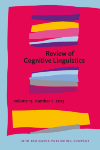
Review of Cognitive Linguistics
Disseminating Knowledge at the Forefront of Linguistic ResearchThe Review of Cognitive Linguistics, published by John Benjamins Publishing Co, is a premier academic journal dedicated to the exploration of cognitive approaches to linguistics. With an ISSN of 1877-9751 and E-ISSN 1877-976X, this journal provides a critical platform for researchers and professionals to disseminate their findings in the rapidly evolving fields of linguistics and language, alongside developmental and educational psychology. Hailing from the Netherlands, the journal boasts impressive standing within the academic community, as indicated by its 2023 Q1 ranking in Linguistics and Language and Q3 in Developmental and Educational Psychology. Additionally, its Scopus rankings reflect a strong position within the arts and humanities and social sciences categories. While currently operating under a traditional access model, this journal actively contributes to the overarching discourse within cognitive linguistics, and is a vital resource for those aiming to deepen their understanding of the intricate link between language and cognition. Researchers, educators, and students are encouraged to engage with the rich body of articles spanning its convergence years from 2010 to 2024, making it an essential read for those at the forefront of these interdisciplinary studies.
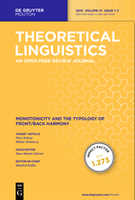
THEORETICAL LINGUISTICS
Navigating the Intricacies of Language StudiesTHEORETICAL LINGUISTICS, published by Walter de Gruyter GmbH, is a prominent journal dedicated to exploring the intricate dimensions of linguistics, positioning itself as an essential resource for scholars and practitioners in the field. Established in 1974, this Germany-based journal has undergone significant evolution, contributing to the theoretical and empirical understanding of language with a focus on diverse linguistic phenomena. As evidenced by its Q2 ranking in the Linguistics and Language category for 2023, THEORETICAL LINGUISTICS engages with innovative theoretical discussions and methodologies, making it a vital platform for researchers navigating the complexities of language structure and usage. Though not an open-access journal, it ensures accessibility through robust distribution networks, fostering collaboration and knowledge-sharing within the academic community. With a consistent output from 1990 to 2024, this journal stands at the intersection of linguistics and language studies, appealing to a wide audience of researchers, professionals, and students alike.